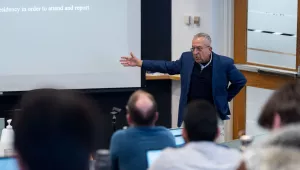Zimbabwe's Spreading Misery
by Robert Rotberg
The economic and political cancer of President Robert G. Mugabe's regime in Zimbabwe now promises to spread to South Africa - and so endanger the continent. Zimbabwe's man-made tragedy desperately threatens all its neighbors, and deeply compromises American attempts to help Africa help itself. President Mugabe's paramilitary troops have brutalized and killed opponents; assaulted lawyers, human rights activists and democratic reformers; and invaded factories and universities as well as farms. Washington, London and Pretoria must act together to end this lawlessness before it undermines the entire region.
Mr. Mugabe turned recklessly violent when the Movement for Democratic Change challenged his 20-year omnipotence. The months before last June's parliamentary elections were rife with intimidation; Mr. Mugabe's paramilitaries killed many opposition activists. The Movement for
Democratic Change still won 57 seats in the 150-seat parliament. Before the election, Mr. Mugabe had controlled all but three seats.
In reaction, Mr. Mugabe and his associates have ignored rulings by the Supreme Court and forced the chief justice to resign, illegally occupied hundreds of (white-run) farms, killed prominent farmers and their supporters, closed radio stations, bombed the only independent daily newspaper, arrested leading opposition figures, legislated to prevent the Movement for Democratic Change from receiving funds from abroad, and rebuffed Secretary General Kofi Annan of the United Nations, the President of Nigeria, and the British and American governments.
As a result of these and other developments to its north, South Africa has seen its own currency depreciated, its economic growth compromised and its race relations, especially in the white farming sector, endangered. Mr. Mugabe has repeatedly snubbed President Thabo Mbeki of South Africa.
Nearly a million immigrants have walked into South Africa from Zimbabwe- an exodus that endangers South Africa's economic future. President Mbeki fears the spread of Zimbabwe's violence to his own country.
Mr. Mugabe hopes to destroy the opposition in advance of next year's presidential election. Only Morgan Tsvangirai of the Movement for Democratic Change is a credible challenger. "I am firmly asserting to you," Mr. Mugabe told a rally in April, "that there will never come a day when the M.D.C. will rule this country - never, ever."
The intimidation has escalated in part because serious shortages of wheat and maize - Zimbabwean dietary staples - are expected later this year. Zimbabwe has had virtually no foreign exchange since September, and production of its biggest exports, tobacco and gold, has shrunk considerably. A trickle of petroleum and electric power continues to arrive from South Africa. Zimbabweans now experience long lines for gasoline and frequent brownouts. Inflation has soared, the currency has lost much of its value against other currencies, gross domestic product has fallen 10 percent, unemployment has reached 60 percent, tourism has declined by more than half, and hospitals and schools barely function. Twenty-five percent of all adults are infected with H.I.V. Life in Zimbabwe is increasingly brutish and short, and most of the responsibility lies with Mr. Mugabe. Washington and Pretoria cannot wait until after next year's election to act, hoping that Zimbabwe will save itself. Mr. Mugabe will not let a free election occur.
Constructive engagement can no longer curb Mr. Mugabe's assaults on Zimbabweans or his flouting of international norms. Pretoria has shown new signs of alarm since South African-owned businesses were attacked last month. South Africa should now stop supplying fuel.
Most Western donors, including the International Monetary Fund, have already frozen aid, and many charitable organizations have abandoned their operations - not least because of attacks by paramilitaries. Washington should refuse visas to Zimbabwean officials and their relatives and work further to isolate Zimbabwe until Mr. Mugabe stops oppressing his people and restores the rule of law.
Rotberg, Robert. “Zimbabwe's Spreading Misery.” The New York Times, May 14, 2001





